Last Updated: 1 year ago
First, let’s put any fears you may have to rest. There’s nothing aggressive or unnatural about those AM head-butting sessions.
For the most part, a cat bunt is just your cat’s way of saying “hi” to you. It’s normal and not a sign that something is wrong with your pet.
So, let’s take a closer look at why your cat keeps headbutting you and discover 10 in-depth reasons for what it means when a cat headbutts you.
Are you ready? Let’s see why does my cat headbutt me!
10 Reasons For Cat Head Butting
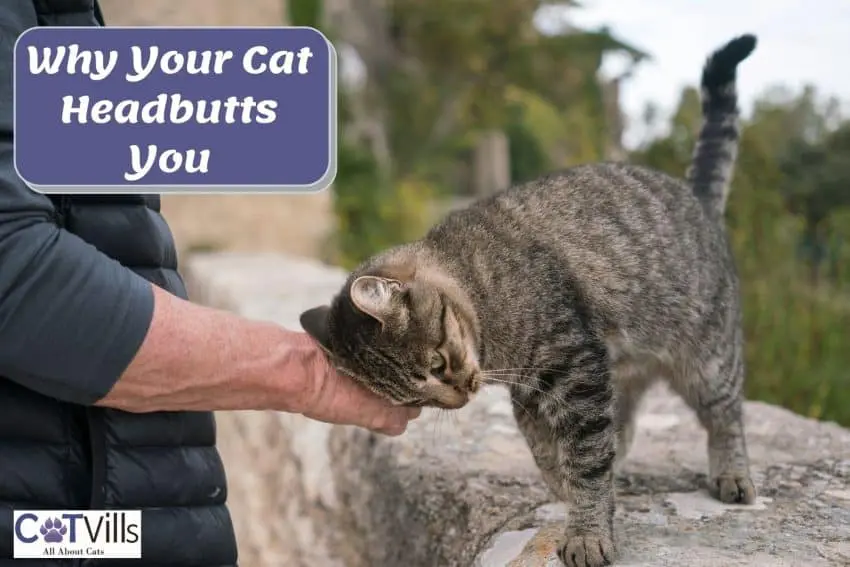
Now let’s see why your cat wakes you up with a headbutt every morning or occasionally.
#1 Sign Of Affection
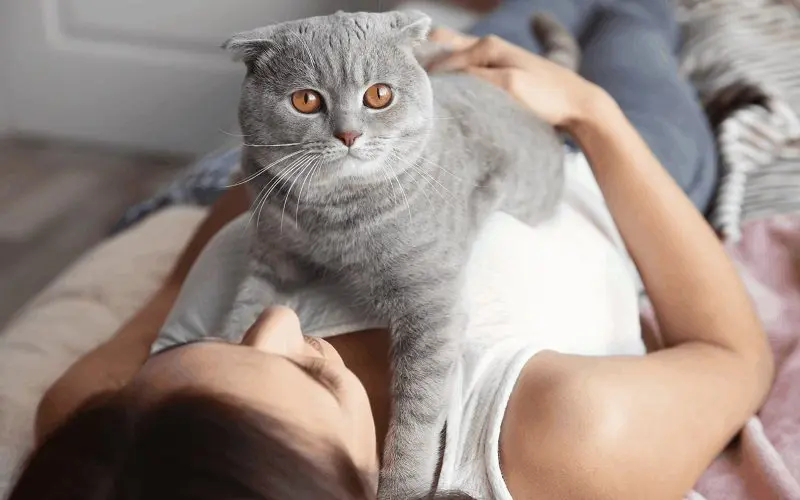
Cats have different sleeping patterns than humans and are most active before dawn.
So while you want to be lazy in bed in the morning, your cat is already up. He or she is just waiting for you to wake up.
Imagine the following situation: your cat climbs up to your bed and gives you a nudge by rubbing your chin. She or he purrs loudly and keeps her head bunting you until you wake up to pet him or her.
It’s obvious what’s going on. Your cat is trying to express affection and show how much they have missed you during the night.
Cats have a reputation for being aloof, but some breeds are attached to their human companions. These cats can be as enthusiastic as dogs when it comes to expressing their feelings.
While it’s not pleasant to wake up early in the morning, you should cuddle or speak to your cat gently. She or he is doing nothing wrong, so there’s no need to yell.
Instead, encourage this behavior, since it can strengthen the bond between you and your domestic cat.
Yes, this will leave you with some fur in your mouth or chin, but bonding and gaining the trust of a pet comes at a cost.
Other ways that felines show affection include:
- Curling their tails around your legs
- Purring when they’re around you
- Cat bringing dead animals
- Nibbling
- Licking and grooming you
- Kneading
- Gurgling
- Following you around
#2 Scent-Marking
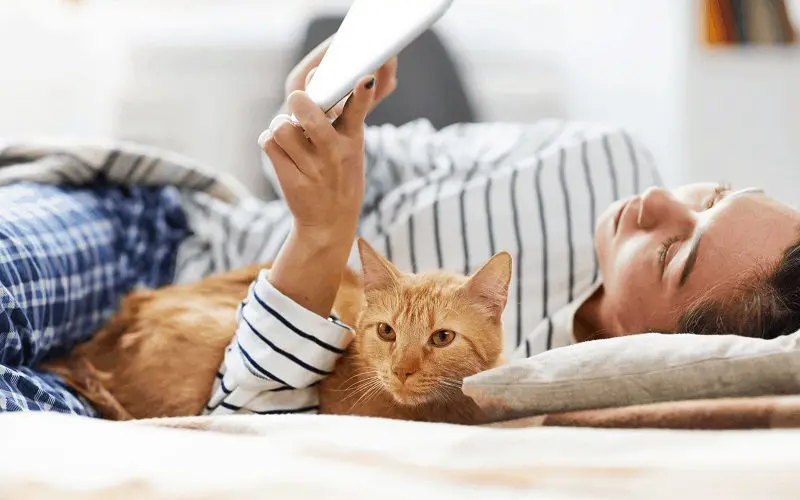
As we already mentioned, cats have special glands on their cheeks.
When they rub and bunt things, cats release pheromones to mark their possessions and territory.
It’s a subtle scent, which you can’t smell. But it’s an obvious sign for other felines that you belong to another cat, and they should stay away.
So, that’s another likely cat headbutt meaning, especially if you have more than one cat and they’re vying for the position of the alpha cat.
Your cat is basically leaving a little bit of their scent to say this is mine.
Cats also scent their ‘territory’ by spraying and urine marking.
#3 Showing Trust
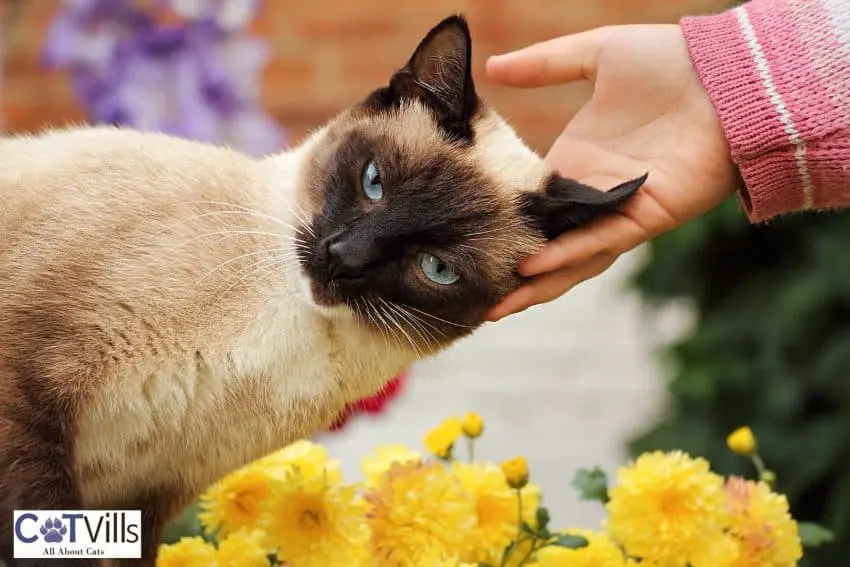
Cats don’t headbutt people they don’t like or trust. They also never head bunt rival cats, unfamiliar animals, or objects that make them nervous.
So, if you’re the “victim” of frequent cat head butts, your feline friend is likely demonstrating how much they trust and respect you.
It’s important not to break this trust by reacting negatively to your cat’s headbutting, or your cat might become shy around you.
Have you ever noticed that your cat is always butting you as a matter of routine but wanders off to a quiet room when there are strangers around? This is a clear sign that they trust you.
#4 Establishing Familiarity
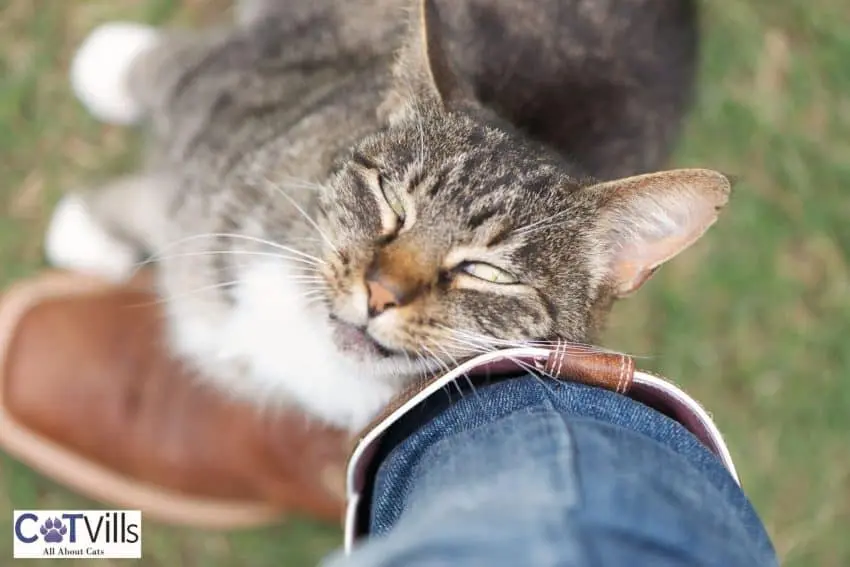
Besides marking their territory to warn other felines away, domestic cats mark people and objects to establish “safe” boundaries.
The familiar scent comforts and calms your cat in times of stress and anxiety. That’s why your cat also cuddles with you at night or when they’re scared.
Think about yourself as a big, living security blanket.
#5 You’re Part of the Clowder
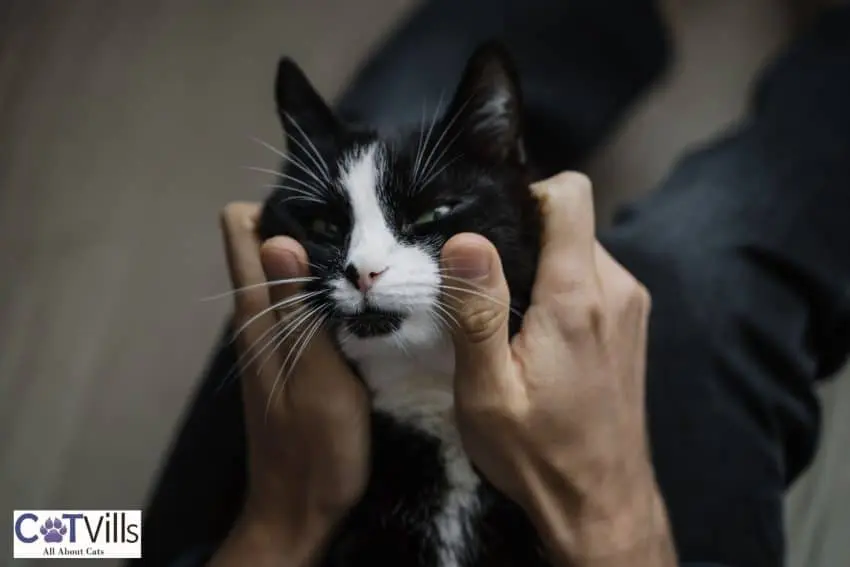
If you have several cats, they may take turns marking you with their scent. That’s not creepy or something you should worry about.
Your kitties are just marking you as part of their clowder and welcoming you to their feline family.
When cats head bunt one another, they create a group scent so that they can recognize members of the clowder.
Group scent communication is vital because it strengthens the bond between multiple cats, prevents aggression in multi-pet households, and ensures peace.
It’s a great show of trust and love if your cats take the time and effort to groom you, rub against your legs, or head bunt you to include your scent in the mix.
#6 Seeking Attention
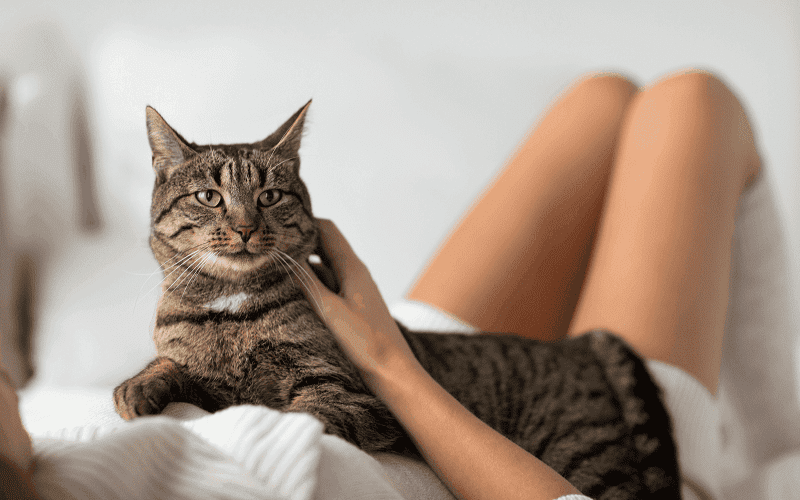
Have you forgotten to feed your kitty or skipped playtime?
Then you shouldn’t wonder, “Why does my cat sits and stares at me for a while then headbutt me so hard?”
Your cat is trying to attract your attention and remind you of your duties. It’s best to listen and spend some time with your feline to appease them.
Keep in mind that if head bunting doesn’t work, your cat may become more “aggressive” by scratching on the furniture, meowing continuously, or nibbling on your fingers.
Other behaviors that seek attention include:
- Circling your legs
- Love biting
- Jumping
- Acting silly
#7 Exerting Dominance
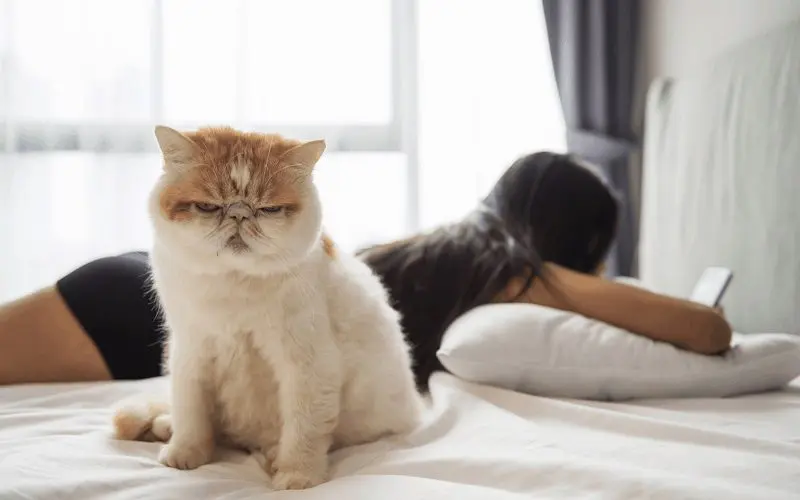
Dominance is also one of the reasons why cats headbutt, especially in multi-cat households.
Your cat may be trying to show its power over you and warn off the other cats from approaching you for petting and food.
Some spoiled cats may also headbutt you because you’ve allowed your pet to believe that they’re the boss of the house. In these cases, your kitty is making a demand and expecting you to comply as soon as possible.
Such behavior isn’t always a bad thing. However, it can escalate if your cat feels its dominant position is threatened. You might notice marking, biting, or inappropriate urination.
It’s best to establish boundaries as soon as possible with your cats and show them what’s allowed and what’s not. Otherwise, you’ll have a hard time retraining your kitty.
And always introduce new members to the family slowly to avoid conflicts and territorial fights.
I’ve found that using pheromone spray, such as Feliway, helps when introducing a new friendly feline to the family.
#8 Communicating a Problem
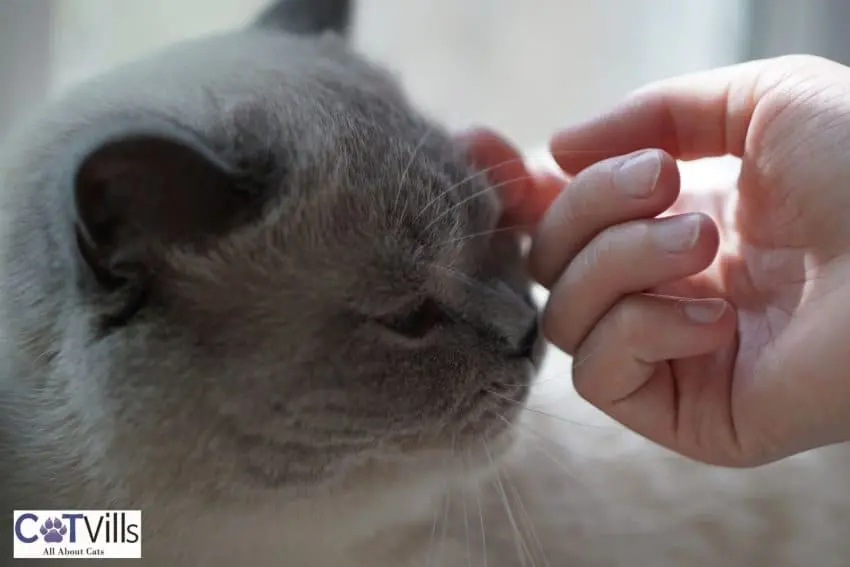
Are you worried about excessive cat bunting? Then your kitty may be trying to communicate a problem.
It can be something simple and easy to fix, such as an empty food or water bowl.
However, your cat may be saying that they’re in pain, scared, or sick.
If you notice other worrisome symptoms or odd behaviors, you should speak to your vet as soon as possible in case there is a health condition brewing.
#9 Showing Respect
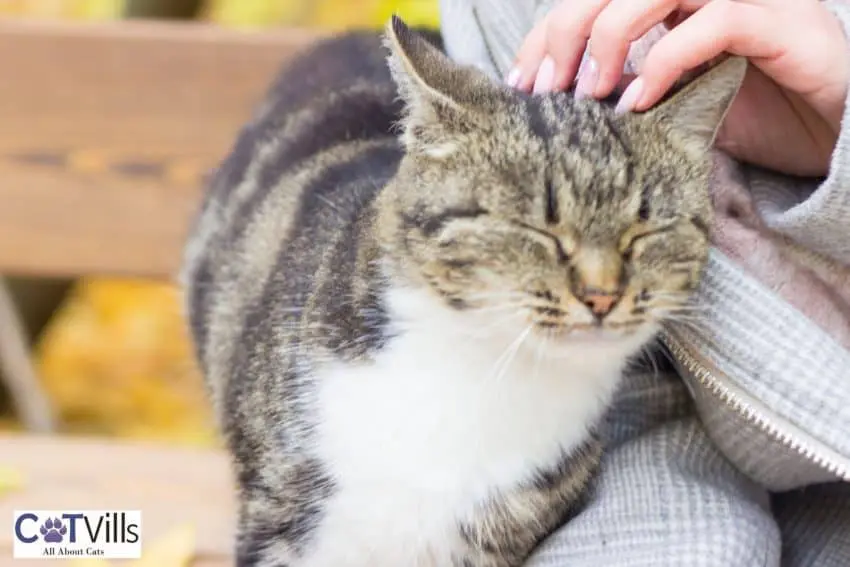
We already explained why headbutting is a measure of deep truth and affection. But a headbutt from a cat can also show respect.
Your cats might not listen to you all the time or ignore you when you call their name.
But if they headbutt you often, your feline companions are saying that they respect and appreciate what you do for them.
#10 No Reason At All
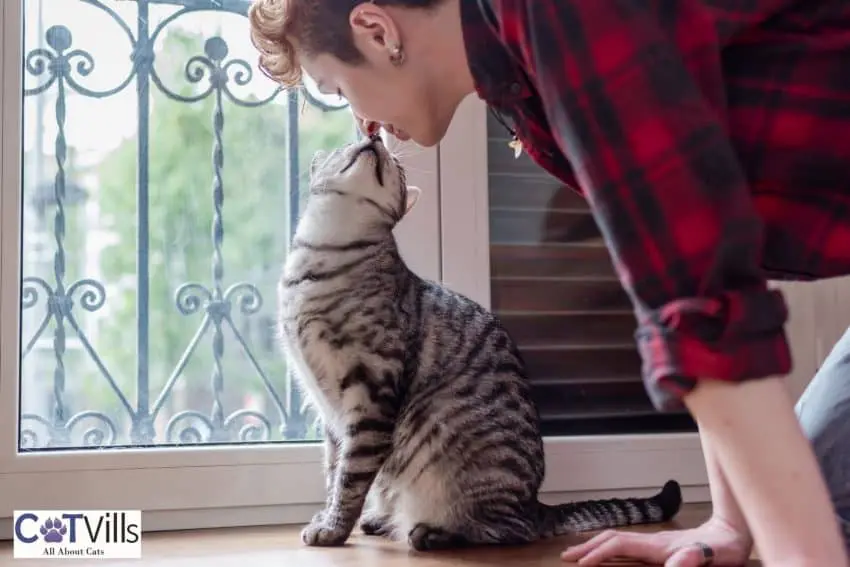
Sometimes cats do things for mysterious reasons. We can only guess why they’re staring at the wall, sitting in the bread loaf position, or kneading our heads.
It may amuse your cat to watch as you try to figure out what head bunts mean. Or your cat simply likes to “hit” objects, and you’re the closest one.
Moreover, kittens and cats often do silly things because they like the extra attention. And how can we deny that it is sometimes the cutest thing?
What Is Bunting in Cats?
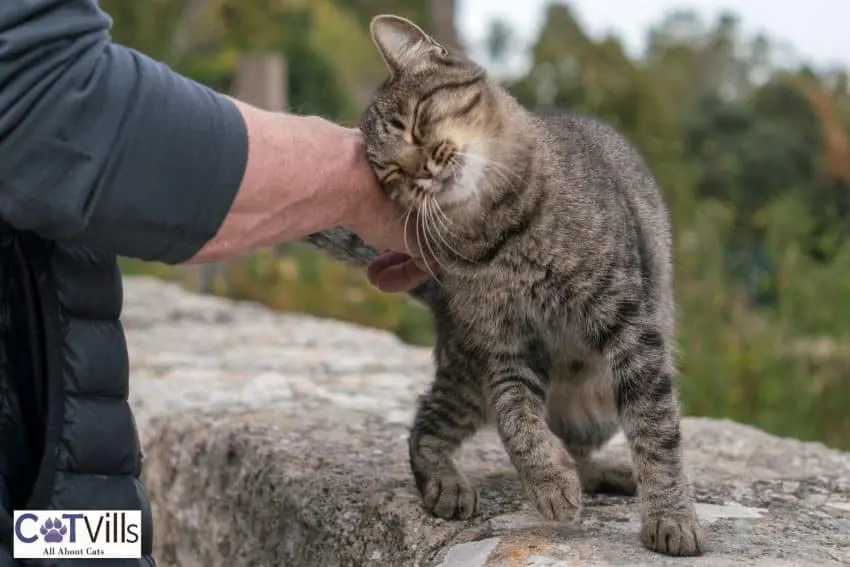
According to Pam Johnson-Bennett, a renowned cat behavior expert, the habit that most cat owners refer to as headbutting is actually known as head bunting.
Head bunting is where your cat gently rubs her forehead onto your cheek, chin, or another body part.
As you’ve figured out, this mostly happens in the morning, but it can happen any time of the day.
You may also observe your cat headbutt objects, furniture, the wall, or other animals.
You see, cats have scent glands in several parts of their bodies, including their heads. So, every time they rub on something, they leave their own scent behind.
When your cat is gently bunting your face, it’s simply a social interaction that involves her leaving her scent on you.
Scent-marking in cats is not just for marking their territory. Sometimes they do it to show that they trust you or as a sign of affection.
Pressing Vs. Bunting Difference
While you may mistake headbutting for head pressing, they’re two different habits.
As mentioned earlier, cat bunting is a head-contact behavior that involves gentle rubs. On the other hand, head pressing involves your cat pushing hard on a surface. It could be a wall, a tree, a piece of furniture, or any other hard object.
While bunting is often a sign of affection, head pressing is caused by pain, neurological problems, a head injury, and certain diseases. It is a serious sign that something is wrong with your cat’s health.
Below are some of the reasons your cat may be head-pressing:
- Head trauma
- Liver disease
- Brain tumors
- Poisoning
- Metabolic disorder
- Central nervous system infections
- Brain inflammation
If you own an aging cat, they may be suffering from CDS (Cognitive Dysfunction Syndrome). This condition makes them lack basic cognitive skills, such as maneuvering around objects.
So an elderly pet may be pressing against an object because they’re stuck and don’t know how to go around it.
Besides head-pressing, your cat could also exhibit odd behaviors, such as:
- Pacing
- Disorientation
- Abnormal vocalization
- Staring
- Seizures
- Running in circles
- Drooling
- A lack of balance
- A lack of appetite
As you can see, head pressing can be the result of a serious health issue.
So if you notice this behavior, accompanied by the symptoms we’ve just listed, it’s best to contact your vet for diagnosis and treatment.
Don’t try to treat cat head pressing at home, and avoid using human medication such as aspirin, even if you think your cat has a headache.
According to the British Veterinary Journal, aspirin could lead to loss of appetite, depression, or, even worse, death.
What to Do When Your Cat Headbutts You?
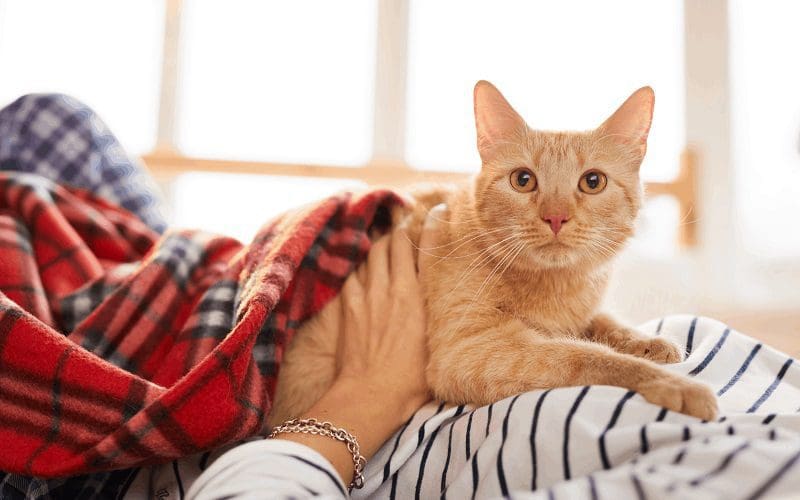
The best way to respond to a cat headbutting is to try and find out why they are doing it.
If they’re seeking your attention, you can pet them, talk to them, cuddle, feed them, bond, and show them that what they’re doing is okay.
But not everyone enjoys being headbutted every morning or when they’re working on something important. So what do you do to stop your cat from headbutting you?
- If you realize your cat is exerting dominance or seeking extra attention, ignore the behavior. When your kitty realizes that it’s not working, she or he will stop bugging you.
- Avoid yelling or hitting your pet since this will damage your bond and make your cat fearful. Instead, redirect your cat to another activity or a toy.
- You can also let out a soft “ouch” when your cat head bunts you to show “pain.” If your cat thinks they’re hurting you, the headbutting should stop.
- Consult a feline behaviorist to find out why your cat keeps headbutting your face.
Should I Headbutt My Cat Back?
Yes, you can, as long as your cat is okay with it.
Since they can’t understand what you’re saying, nor can you understand what they’re saying, you headbutting them will be a unique way of communicating.
Be gentle and observe your cat’s reaction.
Some cats will like it, but other cats will think you’re attacking them, and you do not want to be on the receiving end of a defensive cat.
Wrapping Up
Cats are little communicators, even if we don’t always know what they are saying.
But now, the next time your cat bunts you in the morning, don’t scold or punish her or him. The majority of the time, they are showing they love and trust you.
Your kitty is likely saying how much they miss the moments you spend together. Or they want you to get up and fill the bowl with food.
However, don’t confuse head bunting with head pressing. Headbutting is harmless, but head pressing, such as against a hard surface, is often the result of an underlying health issue.
So, make sure you have your vet check your cat if you’re worried about excessive head butting or head pressing.
Does your cat headbutt you in the morning? Please share your experience with us!
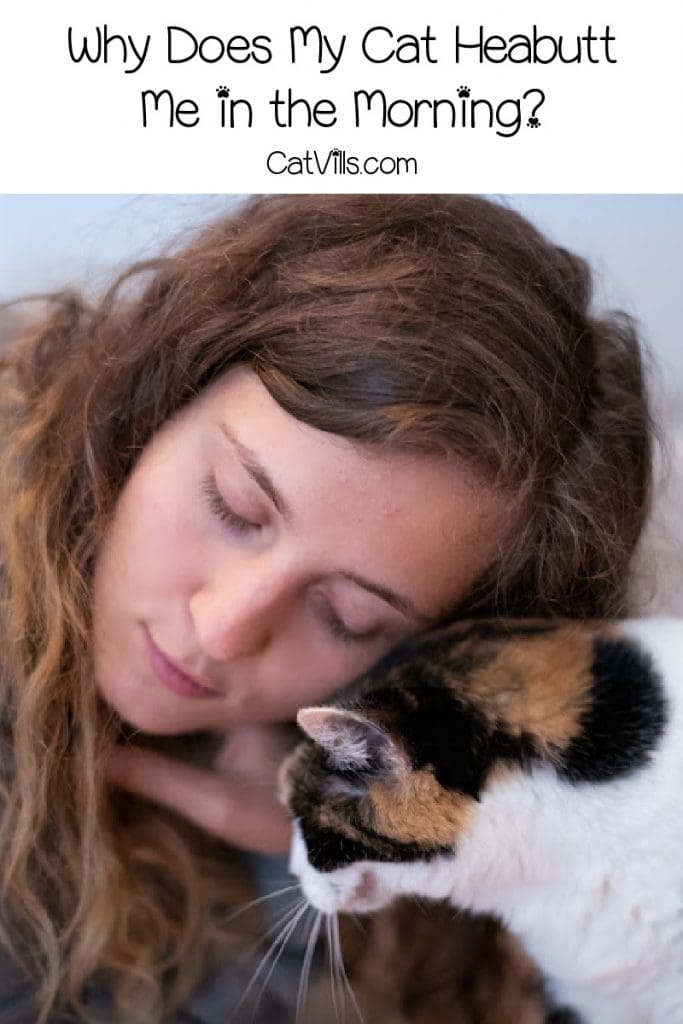

Interesting food for thought when it comes to cat behavior. Head pressing and head butting are so different and all cat owners need to know this.
I don’t have a cat, but that sounds pretty painful.
This was a great read. I knew a few of these reasons but not all of them. VERY cool.
My cats don’t do this. They just meow at me until I feed them. Then they go back to ignoring me.
This sounds like how my kids would wake me up when they were little. Cats are such unique creatures.
I have noticed my brother’s cats doing this but I did not know the reason for it until I read this post. Thank you for listing the other not-so-good / illness related reasons why cats would show this behavior.
Most common one I’ve seen is #4 – they’re all about the headbutt of love! Thanks for sharing, I learnt some things!
I’ve seen this before. Thanks for providing an explanation behind this.
I definitely learn new things about cats every time I read your article. I will share this with my friends, too. Thanks!
Such an interesting cat behaviour. I haven’t really been around cats to see any of these. It will be interesting to watch
This is really interesting to know. My cats have done this a lot. I’m sure it’s a sign of love fom them too.
I love when cats give little head butts!